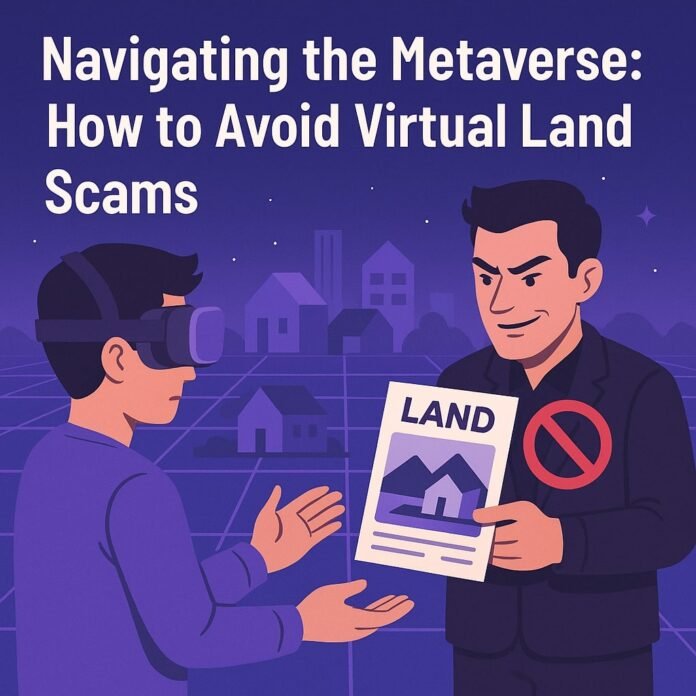By Dr. Pooyan Ghamari, Swiss Economist and Visionary
The metaverse has rapidly evolved from science fiction to a bustling digital economy where virtual land ownership has become a hot commodity. From immersive gaming worlds to virtual social hubs, owning a piece of the metaverse promises exciting opportunities. Yet, with opportunity comes risk. Virtual land scams are on the rise, preying on eager investors and users unfamiliar with this novel market.
As more people dive into buying and selling virtual parcels, understanding how scammers operate—and how you can protect yourself—is crucial. This article unpacks the most common types of virtual land fraud and offers practical advice for safely navigating this digital frontier.
The New Gold Rush: Virtual Land in the Metaverse
Virtual real estate is traded on blockchain-based platforms such as Decentraland, The Sandbox, and others, where ownership is represented by NFTs (non-fungible tokens). These platforms offer users the chance to build, monetize, or simply hold valuable digital properties. This surge in demand has attracted not only legitimate investors but also opportunistic scammers looking to exploit gaps in knowledge and regulation.
Virtual Land Scams: What to Watch Out For
1. Phony Properties
Fake virtual land listings can appear on unofficial websites or unauthorized marketplaces. Buyers may believe they are acquiring legitimate parcels, but the NFTs or deeds they receive are worthless, or don’t actually confer ownership within the platform.
2. Credential Theft via Phishing
Scammers impersonate platform representatives or community members, sending links or messages designed to steal your wallet keys or passwords. Once accessed, your entire digital asset collection, including virtual land, can be drained.
3. Artificial Price Inflation
Some fraudsters manipulate prices by creating hype or false demand around specific parcels or districts. This “pump-and-dump” tactic inflates prices temporarily, allowing early insiders to sell at a profit while others are left with devalued land.
4. Fraudulent Brokers and Investment Schemes
Beware of “investment managers” or brokers promising guaranteed returns on virtual land investments. Many of these are elaborate scams where the scammers vanish once funds are transferred.
5. Forgery and Counterfeits
Fake NFTs or forged ownership certificates can deceive buyers, especially those unfamiliar with how blockchain verifies digital property rights.
Why the Metaverse is a Target for Scammers
The decentralized and global nature of the metaverse means there is no single authority regulating transactions. The complexity of blockchain technology, coupled with the hype around virtual assets, creates fertile ground for fraud. Additionally, blockchain transactions are irreversible — meaning once you send your cryptocurrency or NFTs, there’s no turning back.
Practical Tips to Avoid Falling Victim
- Verify Official Channels: Always transact on verified marketplaces connected to the metaverse platform. Double-check URLs, social media profiles, and community forums.
- Secure Your Wallet: Use hardware wallets and enable multi-factor authentication. Never share your private keys or seed phrases.
- Do Your Homework: Investigate the history and legitimacy of parcels, sellers, and brokers. Use blockchain explorers to confirm NFT authenticity.
- Avoid High-Pressure Sales: Scammers often create urgency to rush decisions. Take your time, and consult trusted sources.
- Engage with the Community: Active participation in official platform forums and social media can alert you to scams and fraudulent actors.
- Consult Experts: For large investments, seek advice from blockchain or legal professionals knowledgeable in virtual assets.
The Role of Regulation and Community Action
While regulation in the metaverse remains in its infancy, some jurisdictions are beginning to examine digital asset laws. Community-driven efforts and industry standards also play a crucial role in establishing trust and security.
Final Thoughts from Dr. Pooyan Ghamari
The metaverse represents a fascinating new chapter in the evolution of digital economies. Yet, like all emerging markets, it attracts bad actors ready to exploit the uninformed. As a Swiss economist observing these trends, I emphasize that success in the metaverse depends on both innovation and prudence.
By educating yourself, practicing cybersecurity hygiene, and approaching virtual land investments with caution, you can safely explore this exciting new digital realm without falling prey to scams.
Remember, your digital assets are as valuable as your physical ones — treat them with the same care and skepticism.



